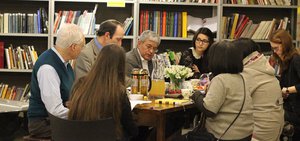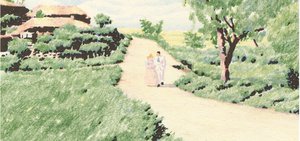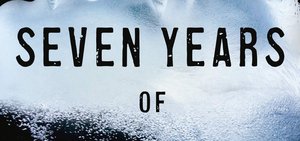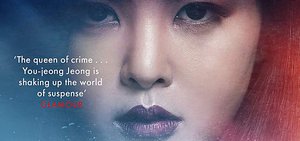Book Recommendations for Korean Literature Night
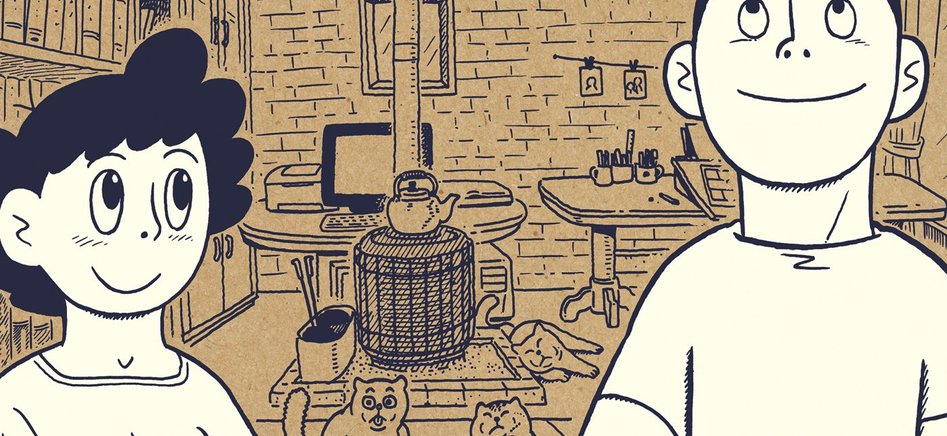
Korean Literature Reading List
Reading a book is a great escape from the worries of everyday life, so during this period of uncertainty and lockdown due to Covid-19, picking up a good book and getting lost in its pages is one of the easiest available self-preservation tools at our disposal. Here is a list of recommended books based on this year's upcoming Korean Literature Night at the KCCUK.
Uncomfortably Happily by Hong Yeon-Sik , (Graphic Novel)
With gorgeously detailed yet minimal art, cartoonist Yeon-Sik Hong explores his move with his wife to a small house atop a rural mountain, replacing the high-rent hubbub of Seoul with the quiet murmur of the country. With their dog, cats, and chickens by their side, the simple life and isolation they so desperately craved proves to present new anxieties. Hong paints a beautiful portrait of the Korean countryside, changing seasons, and the universal relationships humans have with each other as well as nature, both of which are sometimes frustrating but always rewarding.
Hong began apprenticing in a manga studio in 1990, and wrote his first short stories (in comics form) in 1992, but commercial projects kept him from his personal work for another decade. In 2005, Hong and his partner tried to move to the countryside. Two years later, Hong began work on a graphic novel inspired by these experiences. Uncomfortably, Happily was published in two volumes in 2012: it quickly became a critical success, going back for a second printing and receiving the Manhwa Today Award.
Kim Jiyoung, Born 1982 by Cho Nam-Joo
Kim Jiyoung, Born 1982 is the Korean sensation that has got the whole world talking. The life story of one young woman born at the end of the twentieth century raises questions about endemic misogyny and institutional oppression that are relevant to us all.
A GUARDIAN 'ONE TO LOOK OUT FOR 2020'
A RED MAGAZINE 'CAN'T WAIT TO READ' BOOK OF 2020
The Only Child by Seo Mi-Ae (Korean Noir)
In “The Only Child,” Korean author Mi-ae Seo delivers a frightening psychological thriller with echoes of “The Silence of the Lambs” and “The Bad Seed.” The Only Child, is an eerie and absorbing novel following a criminal psychologist who has discovered shocking and possibly dangerous connections between a serial killer and her stepdaughter. It's a terrific English-language debut, as translated from the original Korean by Jung Yewon.
Mi-ae Seo is a bestselling Korean thriller writer and screenwriter. Her works include the novels The Doll’s Garden, Arin’s Gaze, and The Night Your Star Disappeared. In 2009, she won the Grand Prize for Korean Detective Literature for The Doll’s Garden. The Only Child is her English language debut.
Who Ate Up All the Shinga? by Park Wan-Suh
Park Wan-suh is a best-selling and award-winning writer whose work has been widely translated and published throughout the world. Who Ate Up All the Shinga? is an extraordinary account of her experiences growing up during the Japanese occupation of Korea and the Korean War, a time of great oppression, deprivation, and social and political instability.
Who Ate Up All the Shinga? is a pleasure not only to read but to behold. Let us hope that although the author is no longer with us physically, her spiritual presence will be maintained through other excellent translations of her works.--Bruce Fulton "Korean Quarterly "
B, Book, and Me by Kim Sa-Gwa
B, Book, and Me is a haunting and complex portrayal of teenage angst in today’s modern society, of the extreme but ill-equipped morality that manifests inside that sharp edge between youth and adulthood. In a piercing, heartbreaking, and astonishingly honest voice, Kim Sagwa's b, Book, and Me walks the precipice between youth and adulthood, reminding us how perilous the edge can be.
Kim has published five novels, one short story collection, and two essay collections. She received a grant from the Arts Council Korea in 2007 to travel to the US and Europe, during which time she wrote her first novel Mina. As in her novel Mina, Kim skillfully probes the relationship between the dangerous and existential angst of adolescents and the pressures of trying to survive in a globalist-capitalist world.

